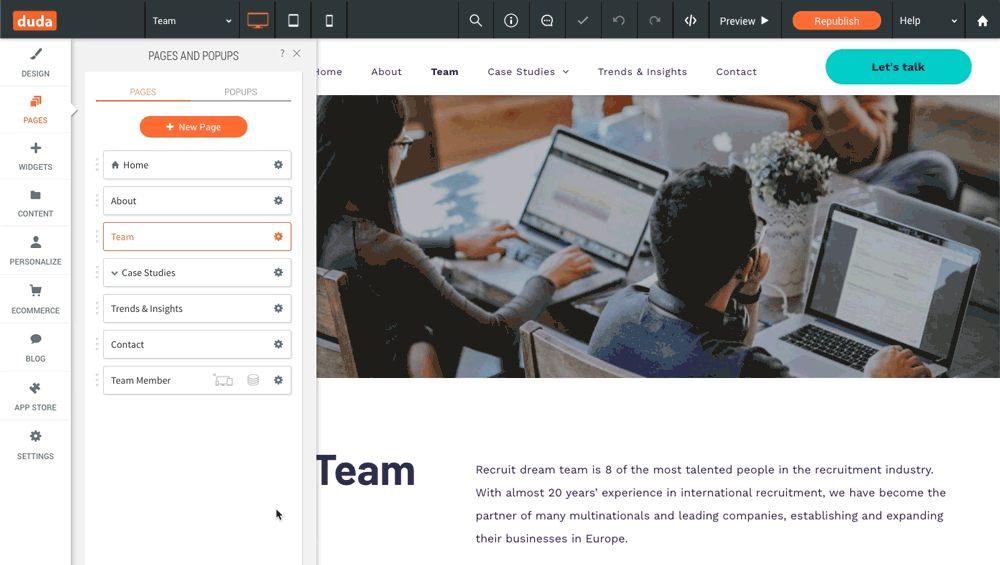Dynamic Website Services
- Home
- Website Development Services
- Dynamic Website Services
Dynamic Website Services
A dynamic website is a type of website that generates content or page elements in real-time, based on user interactions or other parameters. Unlike static websites that display the same content to all users, regardless of their actions, dynamic websites tailor their content dynamically, often pulling data from databases or external sources to present personalized information to each user. This allows for greater interactivity, customization, and functionality, making dynamic websites suitable for applications like e-commerce platforms, social media sites, forums, and online banking portals. Dynamic websites typically utilize server-side scripting languages such as PHP, CMS, or Node.js to process user requests and generate dynamic content.

The Dynamic Website can be used for various purposes across different industries:
Event Management Website
Create dynamic event listings with registration forms and ticket sales. Provide event organizers with tools for managing attendees and schedules.
Real Estate Listings Website
Display dynamic property listings with search filters and map views. Allow users to schedule viewings and contact agents directly.
E-commerce Website
Sell products online with dynamic product listings and shopping cart functionality. Offer personalized recommendations and targeted promotions to customers.
Booking and Reservation System
Enable users to book appointments, tickets, or accommodations dynamically. Manage bookings, availability, and cancellations in real-time.
Content Publishing Platform
Run a dynamic blog or news website with continuously updated content. Engage readers with interactive features like comments, polls, and social sharing.
Social Networking Platform
Build a dynamic community with user profiles, messaging, and activity feeds. Allow users to connect, share content, and engage in discussions.
Dynamic Website
Retain your customers by giving them a fantastic experience through our UI/UX
solutions
Format changing according to your screen size
Custom recommendations based on what you’ve viewed before
Dynamic visuals and animation displays

Better user experience
Integration of social media and offsite content
Language changing according to what country you’re browsing from
Client-side scripting
Client-side scripting involves code that is executed by the viewer’s browser, using scripting languages like JavaScript. This scripting is responsible for rendering changes to the webpage as a response to actions taken within it, such as mouse clicks or keyboard use.
Server-side scripting
Server-side scripting, on the other hand, refers to code that is executed by the server before sending the content to the viewer’s browser. This affects the webpage when it is loaded or visited, like with login pages, submission forms, and shopping carts.
Dynamic Website Elements
Format changing according to your screen size
With the vast array of smart devices in the market, having a webpage that doesn’t scale well can put off visitors. Dynamic website development allows the page to display on almost any screen without compromising its visual appeal and intuitive layout. This includes rearranging buttons, reformatting text and typography, and resizing images to suit the visitor’s display.
Integration of social media and offsite content
One way to add new and changing content on a site is by tapping into social media. Page plugins can display new content from your brand’s social media platforms. Site visitors can see how active your brand is, even if other onsite content isn’t as frequently updated. The addition of these active feeds also gives Google and other search engines more content to crawl through.
Custom recommendations based on what you’ve viewed before
One of the benefits of having cookies integrated into your site is that there is a wealth of information at your disposal for creating a more tailored experience on the site. Based on a user’s previous visit, a dynamic website can offer similar or related recommendations. This is useful for sites with a wide variety of content or for e-commerce platforms.
Dynamic visuals and animation displays
Hero images are a vital part of any website. With the right image behind compelling copy, it can attract a site visitor’s attention almost instantly and encourage them to continue browsing. With the use of dynamic elements, you can have a slideshow of images that cycle or change upon refreshing the page. These techniques can also be applied to video content and animation.
Better user experience
Aside from tailoring each visitor’s browsing experience on the site, dynamic web pages enable other functionalities. Being able to edit the site according to user needs and build a more intuitive navigation are all possible through dynamic websites. Additionally, upgrading and adding more functionalities to a dynamic website can easily be done, making it good for improving the overall user experience.
Language changing according to what country you’re browsing from
By using certain web development tools, a dynamic web page can display in the language of the region a site visitor is viewing the page from. This gives your site content a more familiar voice, as well as further personalizing the overall experience.
